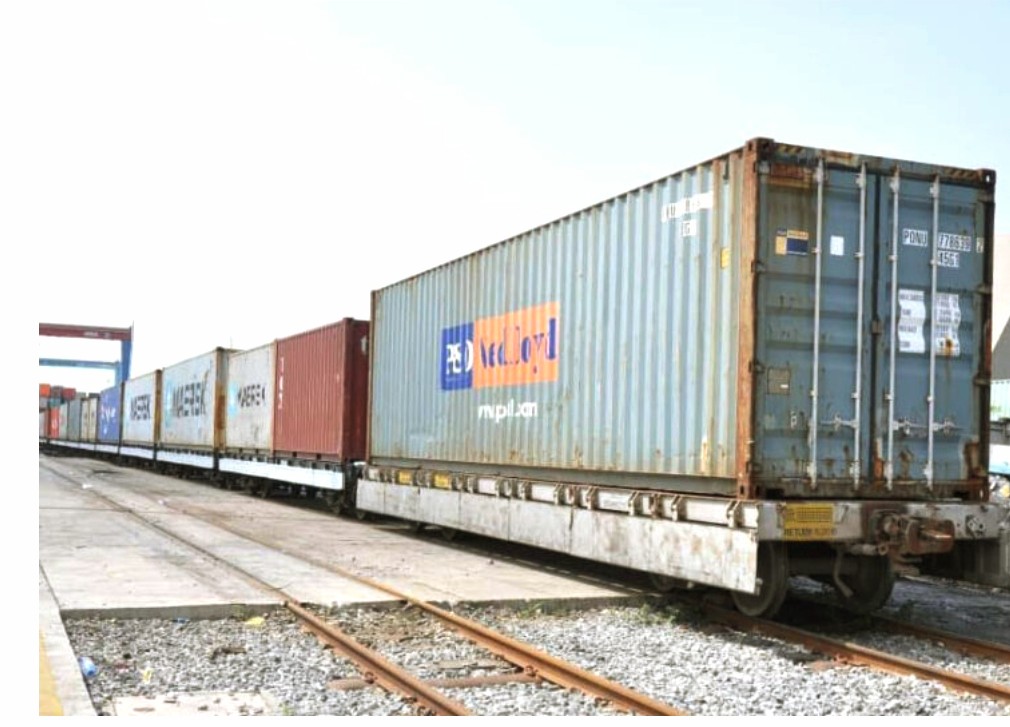Nigeria is losing billions of naira annually as most of its seaports remain disconnected from the national railway system, forcing over 90 per cent of cargo evacuation to be handled by trucks. Currently, only the Lagos Port Complex in Apapa is linked to the rail network, while Tin Can Island, Onne, Calabar, Warri, and the new Lekki Port remain excluded. Stakeholders told NATIONAL ECONOMY that without urgent reforms in financing structures and public-private partnerships (PPPs), the country would continue to suffer from clogged ports, gridlocked roads, and ballooning logistics costs.
Truck-dependent cargo evacuation has severely damaged key port access roads in Lagos and Port Harcourt, leading to frequent repairs that drain public funds. Maritime industry stakeholders said the broader rail sector is crippled by poor port-rail connectivity, shortage of rolling stock, weak policies, low investment, and operational inefficiencies.
Insufficient wagons and locomotives, along with the absence of specialised equipment for containerised and bulk cargo, were identified as major barriers.
A Development Economist and Strategist in Lagos, Alfred John Eze, said funding remains at the heart of the problem. “Rail projects are capital-intensive, yet government funding is often inconsistent. Private sector investment has been slow because the environment for public-private partnerships remains unclear. To truly revitalise this sector, there must be long-term financing structures, transparent agreements, and incentives to attract investors. Otherwise, cargo owners will continue to bypass the railways, leading to more trucks clogging the ports and damaging our roads,” he said.
Dr. Felix Echekoba, a Financial Economist at Nnamdi Azikiwe University, stressed the impact of limited capacity. “Even when trains are available, there are too few coaches to move cargo in large volumes. Many times, exporters are forced to wait days or weeks for space, which is not acceptable in a competitive global trade environment. If we want to reduce logistics bottlenecks, the Nigerian Railway Corporation must expand capacity and operate frequent, predictable schedules. Reliability is what drives confidence in the system,” he said.
The concerns were recently voiced at a summit jointly organised by the Nigerian Shippers’ Council (NSC) and the Nigerian Railway Corporation (NRC), themed: “Limitations to Rail Transportation of Cargo in Nigeria.”
Chairman of the Nigerian Association of Customs Licensed Agents (NACLA), Ifeanyi Isikaki warned, “The narrow-gauge lines currently in use cannot carry heavy cargo efficiently.” He advised importers and investors to continue relying on sea and road transportation until the system is upgraded.
Also, director of the south-south zonal coordinating office of the NSC, Mrs. Agatha Ify Okolue, emphasised that a functional rail network is critical for both trade and infrastructure. “Linking the railway to seaports would improve cargo distribution and ensure a more effective shipping process. The railway system remains one of the safest modes of transportation. It is the only option for moving large volumes of cargo from seaports to inland destinations,” she said.
She added that the summit was convened to draw attention to the role of rail transport in driving efficiency within Nigeria’s logistics chain. While commending ongoing federal initiatives and NRC’s efforts to strengthen the network, Okolue stressed that limitations such as emissions, poor financing, and a shortage of rolling stock must be addressed. She highlighted the 6.2 km Port Harcourt–Aba rail line as a project that could improve connectivity and business activities in the region, underscoring Port Harcourt’s importance as both a port city and an economic hub.
Development economist at Adeleke University, Professor Tayo Bello, underscored the scale of the losses. “Nigeria cannot claim to be serious about trade facilitation if rail continues to play a minimal role in cargo movement. Our peers in Africa like South Africa and Egypt have long demonstrated how rail can support port efficiency and industrial development. Every year we lose billions of naira in value because cargo spends too much time at the ports or on dilapidated roads. It is time to treat rail–maritime integration as a national economic priority, not just a transport issue,” he said.
Speaking on behalf of the NSC executive secretary/CEO, Pius Akutah, the Director of Inland Transport Services, Mustaphar Zubairu, reaffirmed the agency’s commitment to reform. “The Council is committed to efficiency, affordability, and development. NSC is actively promoting inland dry ports to make shipping services more accessible nationwide,” he said.
Zubairu added that the council signed a Memorandum of Understanding (MoU) with NRC to strengthen intermodal transportation, enhance cargo movement to and from dry ports, and reduce congestion on port access roads. “This collaboration demonstrates the government’s determination to tackle infrastructure gaps and reposition rail transport as a critical enabler of economic activity,” he said.
The summit attracted participants from across the maritime and transport value chain, including representatives of the Nigerian Ports Authority, Nigeria Immigration Service, licensed customs agents, freight forwarders, and logistics operators.

